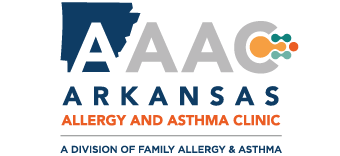How to Deal with Cold Weather Asthma in Arkansas
 Winter is approaching, and the weather is turning colder in Arkansas. For many children with asthma, winter can be a challenging time.
Winter is approaching, and the weather is turning colder in Arkansas. For many children with asthma, winter can be a challenging time.
The cooler temperatures and dry air of winter can affect the airways, causing an increase in asthma symptoms. Here’s a look at why cold weather asthma occurs and how to manage your child’s asthma symptoms in the winter.
Why Cold Weather Asthma Occurs
When children with asthma breathe in cold, dry air, their sensitive airways can narrow, restricting airflow in and out of the lungs. This results in asthma attack symptoms, such as:
- Coughing
- Wheezing
- Chest tightness
- Shortness of breath
Cold weather also means children spend more time indoors, where dry air caused by central heating and pollutants, such as dust, mold, and pet dander, can irritate the airways and trigger asthma attack symptoms.
Certain types of asthma can increase the risk for cold-weather asthma symptoms, including allergic asthma and exercise-induced asthma.
How to Manage Cold Weather Asthma
Preventive care is important for controlling cold weather asthma symptoms. Follow these tips to help keep your child’s asthma under control.
- Dress your child in several layers of warm clothing. It would help if you also wrapped a scarf loosely over your child’s nose and mouth to warm the air before it enters the airways.
- Encourage your child to breathe in through the nose rather than the mouth. Similar to wearing a scarf around the nose and mouth, this helps warm the air before it reaches the lungs.
- Check the weather forecast and limit your child’s outdoor activities when the weather is extremely cold. If your child normally exercises outdoors, encourage participation in indoor sports, such as swimming or gymnastics.
- Clean your home regularly to remove pollutants and improve indoor air quality. For best results, use a vacuum cleaner and air purifier with a high-efficiency particulate air (HEPA) filter.
- Follow your child’s asthma treatment plan and make sure your child takes their medicines as prescribed. Remind your child always carry their quick-relief inhaler to treat asthma attack symptoms promptly when they occur.
- Be alert to increasing quick-relief inhaler use, which is a sign your child’s asthma isn’t under control. If you have any questions or concerns about your child’s asthma symptoms, ask a physician to review your child’s asthma treatment plan.
Cold weather can worsen asthma symptoms, but these tips can make it easier to keep your child’s asthma under control. If your child has cold weather asthma and needs help managing his or her symptoms, please contact Arkansas Allergy & Asthma Clinic today at (501) 227-5210 to schedule an appointment.


